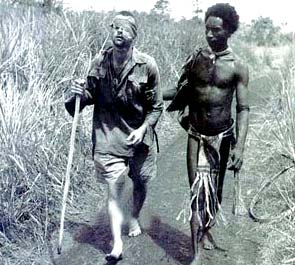
ANGELS OF WAR
Australia, 1981, 54 minutes, Colour.
Directed by Andrew Pike, Hank Nelson, Gavan Daws.
Angels of War is a prize-winning documentary about the involvement of Papua- New Guinea in World War Two.
It is a blend of interview material, sometimes through an interpreter, sometimes in P.N.G. languages with English sub-titles, with documentary footage from the war period. The film captures the Papua New Guineans' capacity to reminisce, communicate by story - genially acted out. The documentary footage ranges from Damien Parer's Kokoda Trail material to propaganda film like Gary Cooper swimming with starlets. There is also a mix ture of material of Australian involvement as well as Japanese occupation.
The Australian government gave nominal recognition to the Papua- New Guinea in volvement in the war - symbolised by the song 'Fuzzy Wuzzy Angels'. The film ends ironically with the P.N.G. receiving pictures of King George VI as reward for their services. Underlying the film is strong criticism of the Australian government and its lack of faith in giving benefits to its allies. Australian solders return to celebrate with their allies. Japanese businessmen also return to remember the war.
The film can be usefully studied in relationship with Peter Tammer's Journey to the End of Night, the autobiographical memoir of about his escape from Rabaul.
1. An entertaining documentary? A record of the past? An important aid to jogging conscience and memory? An interpretation of Papua- New Guinea's involvement in World War Two? Australian involvement? Japanese occupation? The quality of the research - stories, interviews, archival material? The tribute to the Angels of War? The conscience-stirring mess age about acknowledgement and compensation?
2. The quality of the documentary material: The choices for interviews in the present? The selection of action material? Propaganda material - both for the allies and against the Japanese? Japanese archival material?
3. The memory structure of the film: Papua- New Guinea and its attitude tow ards peace, the unwarranted invasion? The occupation by Australians and Americans? The calling up of the P.N.G. men - and boys? The training for war? The occupation by the Japanese? The help? The white master ship - and imposition of rules, even violently, on the P.N.G. men? War changing the P.N.G. way of life? The aftermath for so many veterans? The memoirs and the humorous telling of stories? The interspersing of these stories with footage? The ironic comment?
4. The title of the film - the composition of the poem, the music, the sing ing of the song and its popularity in the 40s? The benign attitude toward the 'fuzzy wuzzy angels'? The Australians depending for their lives on the P.N.G. men? The visuals presented? The Japanese and their attit udes towards the Papua-New? Guineans?
5. The sketch of the P.N.G. people: the background of their culture, peace ful way of life, the mountains and the islands, languages, religion? The war and their involvement - helping, saving? Their being frightened? Tortured? Their being subservient to the Australians e. g. in sexual offences, beatings? The Japanese pressures? The acknowledgement of efforts after the war but no real recompense? The economic changes? The significance of the story of Yauwiga and his injuries - even with the European eye replacement? The final images with the presentation of the portraits of George VI?
6. The film's comment on Australians and their attitudes? Self service in the war? Relationships with the P.N.G. people? Attitudes of superiority? Out of their own culture? The blend of recreation e. g. swimming, the Kokoda Trail and injuries and death? The training of the P.N.G. men? Questions of racism?
7. The Japanese and their treatment of the Papua- New Guineans? In comparison with the Australians?
8. The Australians returning for celebration, tribute, gambling? The comparison with the planeload of Japanese businessmen? The renewing of acquaintances? Monuments? Gifts?
9. The value of this kind of documentary - the memories to be preserved, the criticism of past attitudes, the realisation of changes and improvements? Debts of justice?